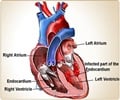A therapy called cardiac resynchronization can significantly delay the progression of heart failure, finds a major international study.
In the study, researchers found that the treatment reduced the risk of serious heart failure events by 41 percent."This shows, for the first time, that the onset of heart failure symptoms and hospitalization for heart failure can be delayed with pacing therapy," said Dr. David Wilber, a co-author of the study and director of the Cardiovascular Institute at Loyola University Chicago Stritch School of Medicine.
A device implanted in the upper chest delivers electrical impulses that help synchronize contractions of the left ventricle, the heart's main pumping chamber.
For the study, Wilber and colleagues included 1,820 patients from 110 centers in the United States, Canada and Europe. Loyola enrolled 13 patients. All patients in the trial had been diagnosed with early stage, mild heart failure (Class 1 and Class 2 on the New York Heart Association classification system).
Patients were randomly assigned to two groups. A control group received an implanted defibrillator, and a second group received a defibrillator plus cardiac resychronization. (A defibrillator is a device that shocks the heart back to a normal rhythm if the patient experiences a life-threatening irregular heartbeat.)
The researchers found that compared with the control group, the cardiac resychronization group had a significantly improved heart-pumping efficiency and a 41 percent lower risk of heart-failure events that required hospitalization or outpatient treatment with intravenous drugs.
Advertisement
"With this study, we have shown that certain patients with early-stage, mild heart failure also can benefit from cardiac resychronization," Wilber said.
Advertisement
It has been published in the New England Journal of Medicine.
Source-ANI
ARU













